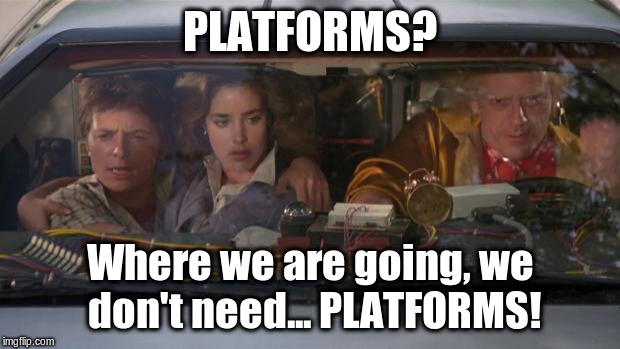The fix for Facebook is NOT a different PLATFORM
An article by Roger McNamee titled “How to Fix Facebook - Before it fixes us” does a great job of describing the problems created by Facebook or any other platforms working in the same way, but contradicts itself when it proposes certain kinds of regulatory fixes.
Those fixes are:
- ban digital bots that impersonate humans
- PLATFORMS should not be allowed to make any acquisitions until THEY demonstrate it wouldn’t cause harms
- PLATFORMS must be transparent about who is behind political and issues-based communication
- PLATFORMS must be more transparent about their algorithms
- PLATFORMS should be required to have a more equitable contractual relationship with users
- There must be limits on the commercial exploitation of consumer data by internet PLATFORMS.
- Consumers, not the PLATFORMS, should own their own data
- Time has come to revive the country’s traditional approach to monopoly
Consumers and (one) country?
Fixes n. 7 and 8 have two built-in limits. One is that any solution to sociopolitical problems that looks at “consumers” instead of “people” or “citizens” is, at best, very limited. At the same time, if we’re talking of platforms with billions members worldwide, any solution by any single country is, by definition, even more limited, and may cause more problems than it solves, in the long run. But the main point of this post is that…
Why fix something that you can (and should!) make irrelevant?

In his article, McNamee himself makes very well a crucial point:
“the internet has lost something very valuable. The early internet was designed to be decentralized. It treated all content and all content owners equally. That equality had value in society, as it kept the playing field level and encouraged new entrants. But decentralization had a cost: no one had an incentive to make internet tools easy to use.”
I agree 100%: decentralization is crucial here. For this very reason I find it contradictory that 7 of those 8 points are about fixing “platforms”. Platforms? We should be going where we do not need platforms, instead.
Insisting to applying correct fixes to the wrong kind of architecture solves very little, in the long run. ANY single platform that may still host millions would preserve the same problems you’re trying to fix. It would be, unavoidably, still be so centralized to make applying those fixes extremely complex, and full of unintended consequences. The only real fix to platforms like Facebook is to make it easier for people to communicate with each other DIRECTLY, without centralized platforms.
Don’t fix “PLATFORMS”. Create personal clouds, instead
The more time passes, the more I am convinced that this is the right approach. I’ve already explained it in detail in posts like:
- “Mastodon is a problem only if you WANT it to be a platform”
- “Forget Net Neutrality. Think personal clouds instead”
- and all my other Mastodon posts.
but in a nutshell, the proposal is:
- please somebody fund development and testing of SIMPLE, interoperable, really usable, really permanent personal clouds like I propose here
- please support their integration with “free as in freedom” smartphones like Eelo
- I’d REALLY like to work on it myself, but if others do it, it’s OK!
Who writes this, why, and how to help
I am Marco Fioretti, tech writer and aspiring polymath doing human-digital research and popularization.
I do it because YOUR civil rights and the quality of YOUR life depend every year more on how software is used AROUND you.
To this end, I have already shared more than a million words on this blog, without any paywall or user tracking, and am sharing the next million through a newsletter, also without any paywall.
The more direct support I get, the more I can continue to inform for free parents, teachers, decision makers, and everybody else who should know more stuff like this. You can support me with paid subscriptions to my newsletter, donations via PayPal (mfioretti@nexaima.net) or LiberaPay, or in any of the other ways listed here.THANKS for your support!